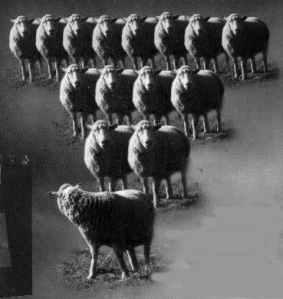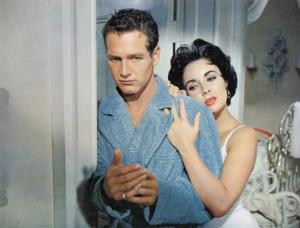 Everyone who has taken a basic English literature class has read Aldous Huxley’s Brave New World and George Orwell’s Nineteen Eighty-Four. Both were written in the 20th century and projected dystopian visions of a government-controlled, post-industrial world. The future imagined in Nineteen Eighty-Four is decidedly more bleak and unpleasant. Huxley’s is still a prison where Shakespeare is banned, but punishment for dissension is merely exile to a remote island as opposed to Orwell’s having your head stuck in a cage with rats, being beaten and otherwise tortured until you are forced to admit that 2+2=5.
Everyone who has taken a basic English literature class has read Aldous Huxley’s Brave New World and George Orwell’s Nineteen Eighty-Four. Both were written in the 20th century and projected dystopian visions of a government-controlled, post-industrial world. The future imagined in Nineteen Eighty-Four is decidedly more bleak and unpleasant. Huxley’s is still a prison where Shakespeare is banned, but punishment for dissension is merely exile to a remote island as opposed to Orwell’s having your head stuck in a cage with rats, being beaten and otherwise tortured until you are forced to admit that 2+2=5.
Social critic Neil Postman wrote: “What Orwell feared were those who would ban books. What Huxley feared was that there would be no reason to ban a book, for there would be no one who wanted to read one. Orwell feared those who would deprive us of information. Huxley feared those who would give us so much that we would be reduced to passivity and egotism. Orwell feared that the truth would be concealed from us. Huxley feared the truth would be drowned in a sea of irrelevance. Orwell feared we would become a captive culture. Huxley feared we would become a trivial culture, preoccupied with some equivalent of the feelies, the orgy porgy, and the centrifugal bumblepuppy. As Huxley remarked in Brave New World Revisited, the civil libertarians and rationalists who are ever on the alert to oppose tyranny ‘failed to take into account man’s almost infinite appetite for distractions.‘ In 1984, Orwell added, people are controlled by inflicting pain. In Brave New World, they are controlled by inflicting pleasure. In short, Orwell feared that what we fear will ruin us. Huxley feared that our desire will ruin us.” [Emphasis added].
I think that as of 2012, we are leaning more towards Huxley’s visions, although there are echoes of Orwell such as:
Surveillance and Police State — GPS tracking through cellphones; monitoring of internet, social media and email usage (which the NSA is tracking); drones; hidden cameras; the erosion of civil liberties following 9/11 (including the possibility of indefinite detention without trial); police brutality … there are rampant examples of a growing police state and the power of government to monitor, track and control its citizens.
Telescreens — Televisions are not (that I know of) a two-way monitoring device, but they are often constantly on in people’s houses which does have a distracting and conditioning effect. Commercials and programming sap people’s time and subtly direct them to believe and think certain things, and the mainstream media is often directed by the special interests of large corporations as well as the government.
This document has further comparisons:
1984 : Ministry of Peace
Now : Department of Defense
“Useless statistics, incorrect economic predictions, and slanted opinions polls are presented on the Evening news as ‘legitimate news’, to give people the impression that ‘things are getting better’, and that all people agree with the popular way of thinking … History is being rewritten, to conform with modern beliefs” (See Howard Zinn’s a People’s History of the United States for proof).
and
“There is always war. If peace is made with one country, war is claimed (or threatened) on another nation to keep the military machine rolling … From Goldstein’s book – “The effect (of the atomic wars) was to convince the ruling groups of all countries that a few more atomic bombs would mean the end of organized society, and hence of their own power. Thereafter, although no formal agreement was ever made or hinted at, no more bombs were dropped. All three powers merely continue to produce atomic bombs and store them up against the decisive opportunity which they all believe will come sooner or later. And meanwhile the art of war has remained almost stationary for thirty or forty years. Helicopters are more used than they were formerly, bombing planes have been largely superseded by self-propelled projectiles, and the fragile movable battleship has given way to the almost unsinkable Floating Fortress; but otherwise there has been little development. The tank, the submarine, the torpedo, the machine gun, even the rifle and the hand grenade are still in use. And in spite of the endless slaughters reported in the Press and on the telescreens, the desperate battles of earlier wars, in which hundreds of thousands or even millions of men were often killed in a few weeks, have never been repeated.”
But, like in Brave New World, our current paradigm is much more benign, though fraught with insidious forces. Not through sleep hypnosis or electric shock conditioning, but by being exposed to thousands of ads per day, we are brainwashed to buy buy buy, that “ending is better than mending.” Our economy depends on large scale consumer consumption of mass-produced goods, and planned obsolescence is necessary as well as the reinforcement of the belief that the accumulation of material goods is one of life’s main aims.
While not engaging in getting and spending, we of course should be playing. In Brave New World spending time alone and in introspective, intellectual pursuits is discouraged. Deep thinking and thinking “outside the box” is grounds for exile, and high culture artifacts and classic literature is banned. Instead, empty, superficial activities are encouraged. We don’t play centrifugal bumble-puppy, but the popular entertainment of today (shopping, movies, video games, TV, YouTube, social media) sure do offer a lot of time-sucking, vacuous fluff.
And then of course, if your mindless job and even more mindless entertainment is not enough to distract you from thinking about the Why and Wherefore of it all, as well as alternate ways of living, then you can just pop a pill and feel good at all times. People who are real and fully alive either live as savages on reservations or are banished to remote locales.
Huxley wrote Brave New World Revisited in 1958 as a non-fiction follow-up in which he concludes that the world was becoming much like he predicted, mainly through the use of subliminal suggestion, subtle but powerful societal pressures and prescription drugs.
Christopher Hitchens, in a 1999 article called “Why Americans are Not Taught History” that references both books wrote: “For true blissed-out and vacant servitude, though, you need an otherwise sophisticated society where no serious history is taught.”
Our educational system is deplorable and cultivates an extremely ethnocentric worldview. Cultural norms in fashion and entertainment are reinforced through the popular entertainment of television, music and mass media, creating superficiality, homogeneity and rampant commercialism and materialism. Whether deliberately or not, Americans are being dumbed down — by the school system, by the media, by the low-brow culture and entertainment, by distracting us with shiny new high-tech gadgets, and by the large-scale use of chemicals in food, water, air and pills/Westernized medicine. If you dare to challenge the status quo, to suddenly say “Let’s stop and look at the logic of what we are doing here,” to challenge the institutions and authority figures and 9-5 schedules and the way things are, well, you’ll end up like the Occupiers. Battered, belittled and finding yourself, like John the Savage, alone and futile in your rage against the machine.

